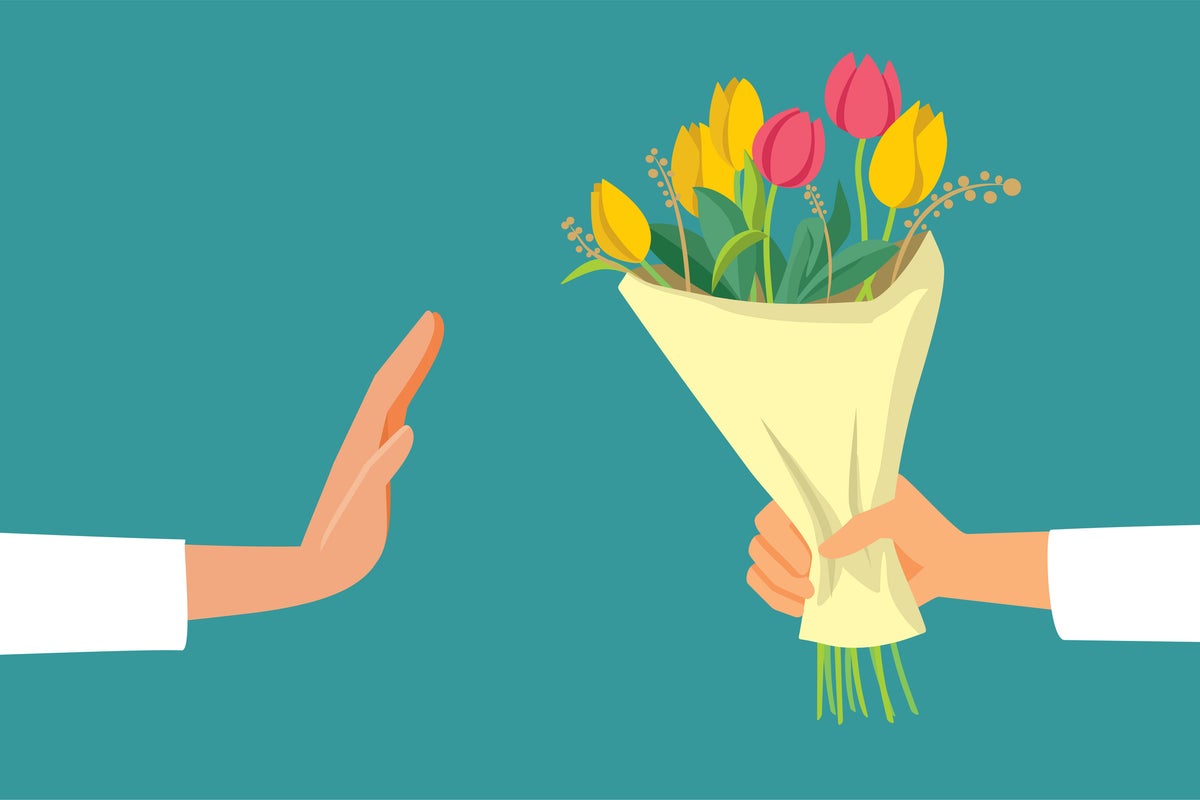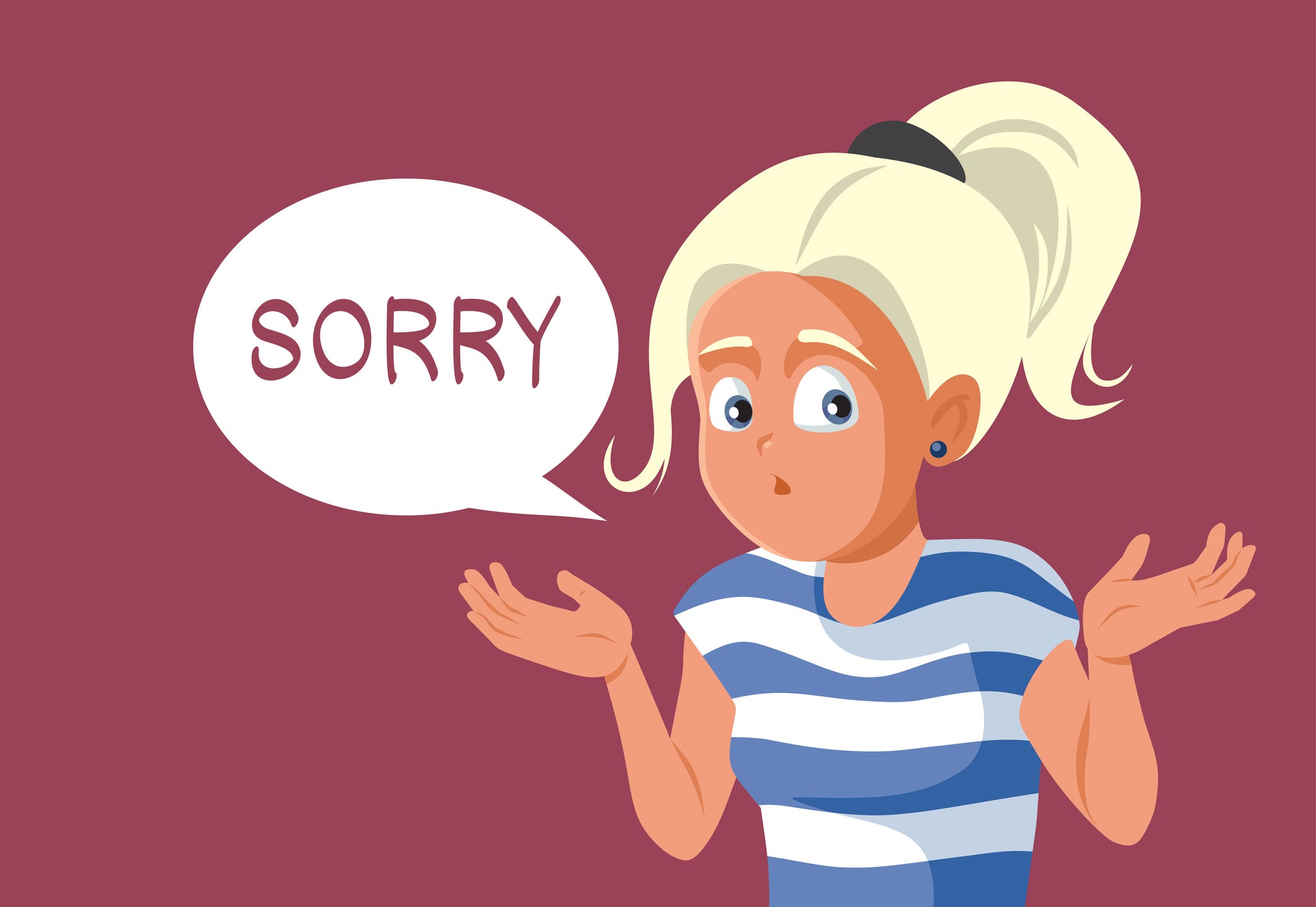
Saying “sorry” is easy. It’s just one word, two syllables. You can say it faster than you can sneeze. Meaning it, however, is a lot harder. According to research commissioned by the language-learning platform Babbel, Britons have 15 uses for the word, with just one of them meaning regret. So seemingly sorry are we all the time that we don’t even know what it means any more.
Here are some of the ways we’re using “sorry” incorrectly: to ask someone to move out of the way. To ask someone to repeat themselves. To show empathy. To express disbelief. To disagree. To mock. And, if we’re British, to preface literally any sentence ever.
“In British English, ‘sorry’ has evolved beyond its original role as an expression of remorse,” explains Noël Wolf, cultural and linguistic expert at Babbel, whose research also found that we use the word “sorry” an average of nine times a day. “It now serves as a social lubricant and a flexible tool of communication used in all sorts of everyday interactions.”
It also reflects our nationwide desire to avoid conflict by way of old-fashioned, sturdy politeness. We keep calm and carry on, as is the British way. “In a culture where directness can feel impolite, and personal space, both emotional and physical, is protected, ‘sorry’ can smooth over moments of friction, no matter how minor,” says Wolf.
The problem with such an overuse of the word is that it has become diluted beyond recognition, and now we’re unsure how to apologise properly for something that actually warrants remorse. How can any of us truly be sorry if we don’t know how to say it? If we’re saying it too much, does the word even mean anything any more? And why do so many of us resort to insipid platitudes when apologising? Few sentences are more grating to hear than “Sorry if I upset you...”
These are some of the questions asked by Marjorie Ingall and Susan McCarthy in their book Getting to Sorry: The Art of Apology at Work and at Home, which examines the reasons why we might be wired to apologise badly, in both our professional and our personal lives, and why it’s holding us back from having meaningful relationships with others – and with ourselves. A central tenet of their argument relates to the rise of celebrity apologies: public statements made via social media, or representatives, that are designed to enshrine the celebrity’s reputation by minimising bad behaviour. Or occasionally denying it altogether.

We’ve seen this play out countless times in the public eye, with everyone from Drew Barrymore and Lena Dunham to Ashton Kutcher and Mila Kunis issuing statements to address allegations against them. Not to mention Britain’s endless list of terribly sorry politicians. Often, the apologies are long-winded, PR-executed masterpieces. Occasionally, they’re laughably weak and serve as the jumping-off point for an entirely new genre of meme; there are, in fact, several lists compiling the “worst celebrity apologies”.
“They tend to centre the person apologising rather than the people receiving the apology,” says Ingall. “Rarely do they say exactly what they’re apologising for, making them sound fake and like clear attempts to squirm out of trouble rather than a legitimate attempt to make amends.” The result, Ingall posits, is that they set a precedent for apologising badly; for finding every excuse possible to shift the blame and avoid taking accountability, in a bid to protect our reputation – as if we, too, have a globally recognised public image to consider.
“This is because our brains are designed to protect us, to help us see ourselves as the hero of our own story,” explains Ingall. “If we didn’t think we were decent people, it would be hard to get through the day. This means that when we’re faced with the cognitive dissonance of ‘I’m a good person but I did a bad thing’, we tend to fix that uncomfortable dissonance by telling ourselves what we did wasn’t really that awful, that we don’t really have to apologise, and that the other person always overreacts.”
The problem is that the celebrity apology framework has created a consensus whereby apologising is treated as a means to become the hero in a story where you’ve been positioned as a villain. It’s this method of self-protection that has prompted the rise of phrases such as “I’m sorry you feel that way” and “I’m sorry if I hurt you”, or even “I’m sorry if you were hurt.” We use “passive voice and rhetorical dodges to avoid really acknowledging the harm we’ve done and taking responsibility for it”, says Ingall.
There are other reasons why it might be harder for certain individuals to apologise, and that could change depending on where you’re at, emotionally and mentally speaking. “Apologising threatens our sense of identity,” says Dr Jenna Vyas-Lee, a clinical psychologist and co-founder of mental health clinic Kove. “To admit fault often brings up shame, fear of conflict, or defensiveness, especially if we’ve grown up in environments where mistakes were punished or vulnerability was unsafe.”
Power dynamics can further complicate things, as can context; apologising to a boss or a colleague obviously differs significantly from apologising to a partner or a parent. And the way you apologise to friends can also be dependent on the nature of your friendship. “Add cultural norms, like the British preference for understatement, and it’s no wonder people get it wrong,” says Vyas-Lee.
Receiving a weak apology can be frustrating, to say the least. Not only does it tend to downplay whatever has happened to warrant the apology in the first place, but it also creates a feeling of isolation in the person who feels hurt or hard done by – like there’s no sense that the other party understands where they’re coming from, or why they feel wounded.
To admit fault often brings up shame, fear of conflict, or defensiveness, especially if we’ve grown up in environments where mistakes were punished or vulnerability was unsafe
So, what does a good, authentic apology look like? Long and wordy, apparently, at least according to one study this year, which found that people perceive apologies that feature longer words as more genuine. “This is in line with signalling accounts that propose that apologisers should incur a cost (greater production effort) to indicate the sincerity of their apologies,” states the study’s abstract. Elsewhere, research has indicated that the main thing people want from an apology is to feel understood, as well as an acknowledgment of responsibility on the part of the person making it.
“An effective apology has three parts: name the behaviour, acknowledge the impact, and offer repair,” explains Vyas-Lee. “For example: ‘I spoke sharply earlier. I imagine that felt dismissive. I’ll try to speak more thoughtfully next time.’ Keep it specific and genuine; avoid hedging words like ‘if’ or ‘but’.” It can also be helpful to extend an apology beyond a single moment. It’s not as simple as saying “sorry”, even with all the right rhetorical paraphernalia attached to it, and moving on. An apology has to be extended if it’s going to be meaningful.
“A day or two later, check in with the person,” suggests Gemma Logan, relationship and friendship expert at The Brighton Bucket List. “Say something like, ‘I’ve been thinking about what I said, and I still feel bad about how I handled that. I want you to know I’m taking it seriously.’ It shows lasting care and respect.”
Whichever way you spin it, there is no excuse for giving a bad apology – particularly not as a fully fledged, emotionally mature adult. But if you’ve been the donor of one (or two) in the past, at least now you know what not to do to make things right. Sorry, hope that’s clear.
What the world’s healthiest people eat – and how you can do it too
Teen cuts ties with adoptive parents after they missed her graduation over a Labubu
Pedro Pascal opens up about managing his anxiety after quick rise to stardom
Weight-loss jabs could reduce asthma symptoms in obese people, study says
Walmart is rolling out AI ‘super agents’ to help you shop
Sacha Baron Cohen in U-turn on Ozempic comments after debuting buff look







